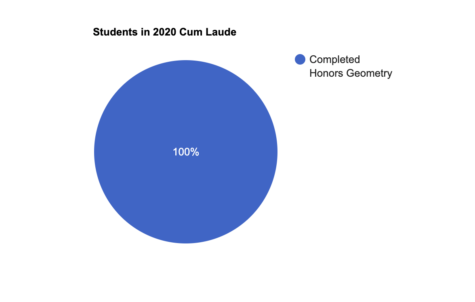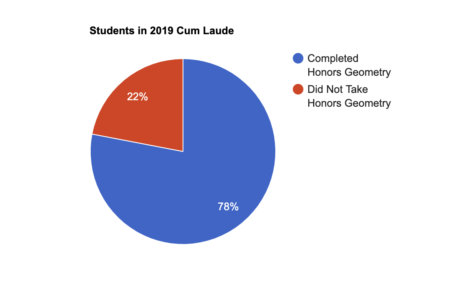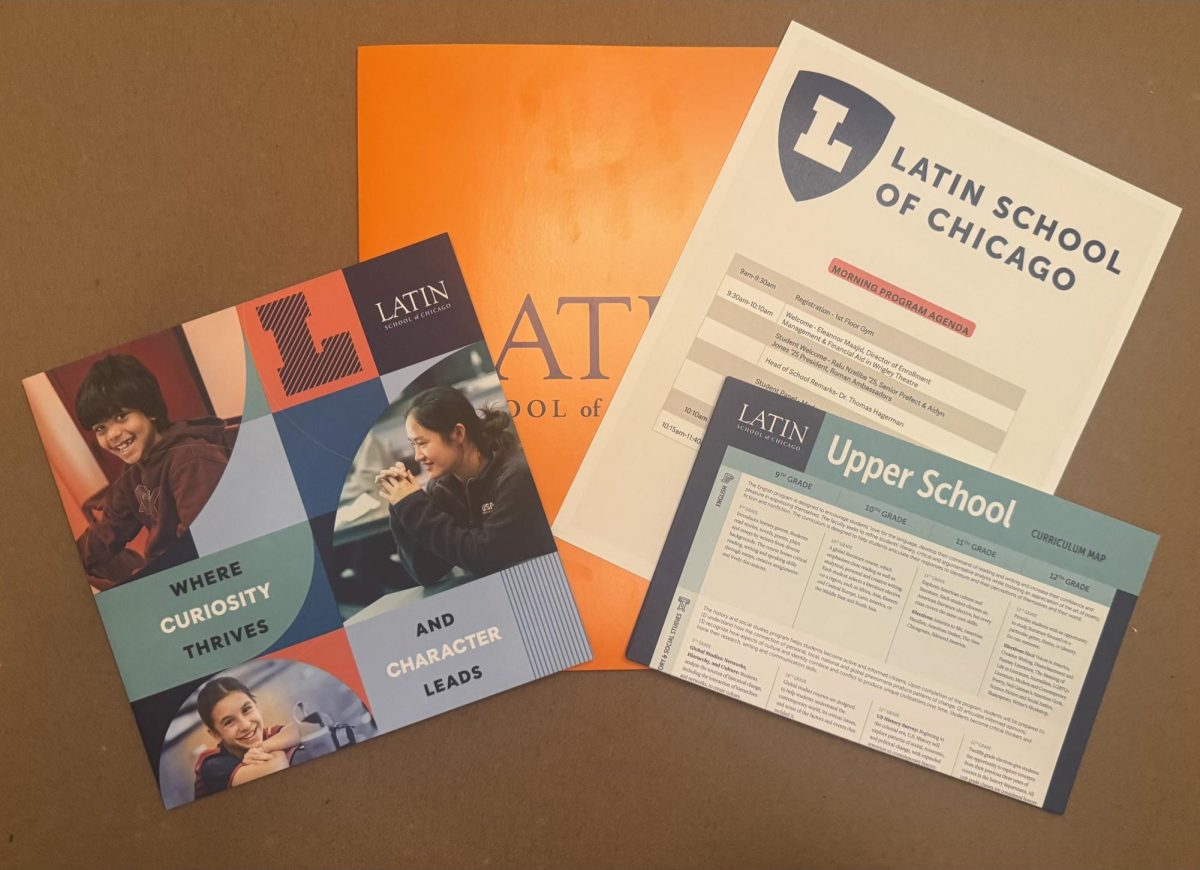Honors Geometry: Cum Laude’s Common Denominator
Participation in Honors Geometry at Latin is a key predictor of a student’s admission into the elite Cum Laude Society. In fact, it’s essentially a requirement. A rare student is able to attain Cum Laude status without checking the Honors Geometry box but they are the exception, not the rule.
In 2020, 100% of Latin students admitted to Cum Laude took Honors Geometry. This year, 87% of students admitted to Cum Laude took Honors Geometry. Going back to 2019, 78% took Honors Geometry.



In 2019, 22% of the Cum Laude students took Honors Geometry as Freshmen. In 2020, that number increased to over 34%, and this year, it’s over 60%. The numbers over the past three years show a clear and significant trend that not only does a student need to check the Honors Geometry box, but they have a better chance of admission to Cum Laude if they check the Honors Geometry as a Freshman box.
Cum Laude is the national honors society recognizing the most distinguished students in the class. History teacher Ingrid Dorer-Fitzpatrick, and faculty lead for Cum Laude, explained that “a student’s academic record is the main criteria for selection,” but added that “in addition to looking at academic achievement, we ask ourselves if those eligible on the basis of academic excellence meet the standard expressed by the society’s motto.” Cum Laude’s motto is ARETE (excellence), DIKE (justice), and TIME (honor). Ms. Dorer also noted, “It should be clear that as Latin moves towards standards-based grading, Cum Laude selection will have to move away from using GPA as a criterion.” For now, a student’s weighted GPA is the sole criterion so long as the student also meets the motto for Cum Laude.
As junior Nina Burik reported in the October 4, 2019, Forum, “Those who attended Latin’s middle school likely recall the notorious math split of sixth grade. This divide placed students into one of two math tracks: Pre-Algebra or Accelerated Pre-Algebra, based on their performance on a placement test, their ERB results, and teacher recommendations. In the remaining years of middle school, students followed their assigned math track until they took another placement test in eighth grade. This exam decided the student’s future courses in high school.”
This past February, Latin announced their decision to eliminate Honors U.S. History (HUSH) from the junior year curriculum, in favor of an earned honors system in which students can elect to earn honors over the course of the entire year. One of the reasons for the shift was that decisions about honors placement relied too heavily on a student’s earlier performance in high school, specifically the first semester of sophomore year.
The Forum reached out to Upper School Math Department Chair Andrew Stroup for clarification about how honors math tracking works based on placement tests from fifth or eighth grade, as well as to ask about how the process is affected by a student’s enrollment at Latin in middle school. “I can’t address how placement occurs in fifth grade, Eve Bonneau [Middle School Math Department Chair] would be able to answer those questions,” he said. Mr. Stroup addressed high school placement emphasizing that in the Upper School, “the department meets every spring to discuss each student and which math classes would provide opportunities for success for the student and challenge them appropriately.”
Ms. Bonneau explained the Middle School math placement process. “Every year, we do some ability grouping,” she said. “We really are trying not to call it ‘Math A’ or ‘Math B,’ just because those connotations make it sound like one is less desirable than another, but basically at the end of fifth grade, students will take a placement test, and we also use their ERB scores from fifth grade, the quantitative reasoning and the math achievement ERB scores, plus we talk to the fifth grade math teacher and get their recommendation.” Ms. Bonneau confirmed that incoming freshmen graduating eighth grade at Latin, who were not in the Middle School accelerated class, are not eligible to take Honors Geometry as freshmen because “there is too much important information in Honors Algebra II that is foundational for success in Precalculus and Calculus.” She also confirmed that a student coming from outside of Latin into ninth grade with the prerequisite algebra and standardized testing could be placed in Honors Geometry.
Despite the Middle School’s best efforts to properly message the bifurcation of the students, Middle School accelerated math is commonly referred to by Latin students as “A Math.” “A Math” students take Honors Geometry as ninth graders because they have taken Honors Algebra II as eighth graders. Algebra II is a mandatory prerequisite for Honors Geometry. Latin eighth graders as well as incoming freshmen from other schools are able to test into Honors Algebra II, making them eligible for Honors Geometry as sophomores. Of course, as Ms. Bonneau indicated, there may be the occasional incoming freshman from outside of Latin who has learned the Algebra II material in their middle school of origin and is eligible for Honors Geometry as a freshman, but that scenario is not common. For the most part, to be eligible for Honors Geometry as a freshman, a student needs to have participated in eighth grade Honors Algebra II at Latin. Students are sometimes able to participate in Honors Geometry as sophomores even if they did not take Honors Algebra II their freshman year. According to Mr. Stroup, “Students move from non-honors classes to honors classes every year.”
Sophomore Daniel Radner transferred to Latin as a freshman and was not placed into Honors Algebra II. He is currently taking Honors Geometry. He is an example of a student who made the transition to honors. “It’s hard for me to believe that only students who went to Latin in middle school have the ability/qualifications to take Honors Geometry freshman year,” said Daniel. “I hope Latin becomes cognizant of this divide between new students and those who came from the Latin Middle School.”
According to Carly Berwick, in an article for Edutopia, “Research suggests that math tracking is not an effective practice for improving student performance. … A 2016 meta-analysis of nearly 100 years of research found that between-class grouping, or tracking, did not benefit students at either the high or low ends of achievement, although fully jumping a grade can lead already high-achieving students to academically outperform same-age peers. Additionally, children are acutely aware of where they stand in tracked classes and identify as ‘smart’ or ‘not smart’ based on their placement—beliefs that can stick with them for life.”
The sixth grade honors placement in Latin’s Middle School does just that—pushes those accepted into accelerated math one full year ahead. “It is not a regular honors level placement, it is uber honors,” explained Ms. Bonneau. “It is really pushing you a year ahead of where most students would be in an honors grouping.”
Sophomore Madison Vanderbilt, who transferred to Latin in fifth grade, said that “Latin does not necessarily foster an environment in which course placement is viewed without biases,” and that “by far, the biggest consequence in not being in honors math courses at Latin is the stigma attached to it.” Madison added that not being placed into honors “can really take a toll on a student’s self worth and willingness to learn.”
I don’t know if we’ll ever get past students feeling bad,” said Ms. Bonneau about students not being placed into Honors. “But what I do think we have control over is our messaging,” she added, “and it has to start when kids are young, and that is the whole growth mindset around math, which is that you are not born with a math brain or not with a math brain, with hard work and belief in your ability to change and grow, you have the ability to do well in a subject.”
Mr. Stroup cautioned against describing Latin’s math placements as “tracking.” He makes clear that a students’ Middle School placement or placement into Honors Geometry does not determine a student’s future courses in high school. Moreover, when Mr. Stroup was asked if there is a way to catch a student with potential up, he pushed back, encouraging a growth mindset instead. “I would push back on the use of language like ‘catching up in math,’” Mr. Stroup said. “My questions would be what are we catching up to? We all learn at different rates. Additionally, adolescents are still in the midst of emotional and intellectual developments. To that end, we try to provide as many paths as possible to support student growth and development. For example, we recently created a pathway for students to take BC Calculus and Multivariable Calculus concurrently with the support of their teacher.”
AB Calculus, BC Calculus, and Multivariable Calculus are not available until a student has completed Precalculus. Only students who took Honors Geometry as freshmen are eligible for these classes as juniors. Completion of at least Honors Precalculus is also a prerequisite to participating in both AP Physics classes. AP classes and honors classes are both weighted at +0.5 on the GPA scale. Only students who took Honors Geometry as freshmen are eligible to take these AP Physics classes as juniors.
Senior Maya Gray said, “One issue I’ve noticed is that new kids coming in don’t have the same opportunity Middle School Latin kids do to place into ‘A Math,’ which I think is extraordinarily unfair.”
Junior Joey Gorman said, “If I had been given the chance to take both Honors Algebra II and Honors Geometry as a freshman, I would have strongly considered doing that, so I could have caught up to the more advanced math students at Latin.” But he added that he has “been so grateful that [his] math teachers over these past few years have allowed [him] to continue to explore [his] love of math outside the standard track.” He was especially grateful that [Upper School math teacher Zachary] McArthur, who he had for Honors Algebra II as a freshman, “recognized [his] love of the subject and… encouraged [him] to join the math team. He also encouraged [him] to take AP Statistics as a sophomore.”
Sophomore Will Del Hierro is a lifer at Latin and a Middle School “A Math” student. Because he was in Middle School “A Math,” he took Honors Geometry as a freshman. “Right now, I’m in a high math track because of my performance at the beginning of Middle School, and that doesn’t feel fair. I think that there are many other people who ended up being just as interested or more interested in math than me who will not have the chance to take higher level math courses in high school. Not to mention students who transfer from middle schools that may not have had an accelerated program.”
Mr. McArthur discussed the correlation of students in Cum Laude and students who have taken Honors Geometry. “That doesn’t mean they took it their freshmen year, but it’s still interesting,” said Mr. McArthur. “I have to say that it surprises me that 100% of the students in Cum Laude took Honors Geometry. Is it because they got that GPA bump or the classes they were able to take alongside it? But the students who can do well in an honors math class I would expect to do well in other classes too,” he added.
“I do think that in sixth grade, when you were put into a math class and someone is put into a higher math class, they were probably better at math than [the other students] then. That’s not necessarily the case now, but as I said, every year we reevaluate,” said Mr. McArthur. “So it’s not like what you get put in sixth grade you are stuck in; every year it’s like how do they do in the course and do we think they would be successful in whatever course for the next year.”
When asked if they were surprised if 100% of 2020 Cum Laude took Honors Geometry, junior Kazi Stanton-Thomas responded, “Not particularly, I think honors classes tend to be handed out, sometimes there doesn’t feel like there are many requirements to get into an honors version of a class.”
Senior Marianne Mihas is a member of Cum Laude, Latin lifer, and Middle School “A Math” student. Like Will Del Hierro, Marianne took Honors Geometry as a freshman. She pointed out that the selection into “A Math” in fifth grade is justified because those students have continued to excel and show excellence. “The highest math track that starts in fifth grade has proven to be at least a decent indicator of students who are smarter at math. Call it whatever you want, but we have to have some word that describes it whether it’s smarter, harder working, etc.” Marianne added that “there should be a way to jump tracks somewhere between sixth grade and junior year because that’s five years where you’re stuck.”
Mr. Stroup explained how students are not stuck, as they are not limited in their options as upperclassmen by their math placement in earlier years. “The department does not view there being ‘tracks’ at Latin, that student placement is fluid and is intended to provide a student with a course that challenges them and that they can be successful in,” Mr. Stroup said. “I often get questions from students and parents about what course the student will take as a senior based on their ninth grade placement, and I can honestly say I have no idea.”
Chris van Benthuysen, known by most as Mr. Van, is teaching two sections of BC Calculus, one section of Honors Accelerated Precalc and Differential Calc, and one section of Honors Geometry this year. He points out, “The Math Department as a whole has a conversation about literally every freshman, sophomore, and junior to figure out what we think is going to be the place they are best set up for success.” Mr. Van emphasized the need for balance and the importance of students “not having to grind it out.” Mr. Van said that “there are very few students, if any students, in any Honors Geometry class that I have had, that I would say couldn’t handle going to Accelerated. But at the end of the year, if the best thing we could say about their experience in that class is that ‘they handled it,’ then I would say we did a disservice by putting them in that class.”
Multiple interviews conducted by The Forum for this article have shown a consistent theme from the math faculty that the Math Department is committed to providing multiple and individualized paths for each student. Mr. Stroup emphasized, “Student pathways at Latin are so varied based on their development and interests. Additionally, we have created opportunities so that all math classes are available to all Latin students regardless of their ninth-grade placement.”
These opportunities just may not be available early enough to affect a student’s ranked GPA, given how honors classes and AP classes are weighted. Further, taking these classes may not feel realistic for the student who was not placed into the highest honors math class just because they would not feel comfortable. “I would 100% be in support of removing weighted grading,” said Mr. McArthur. “I definitely like the idea of people taking higher-level math not because of the GPA bump but because they are interested and want a challenge in that course.”
That is the challenge for Latin’s Math Department and it will require a growth mindset.
Marin Creamer contributed to the interviewing process of this article

Matthew Kotcher ('23) is thrilled to continue to serve on The Forum as the Arts Editor and now as Director of Staff Recruitment and Development. Matthew,...



















































